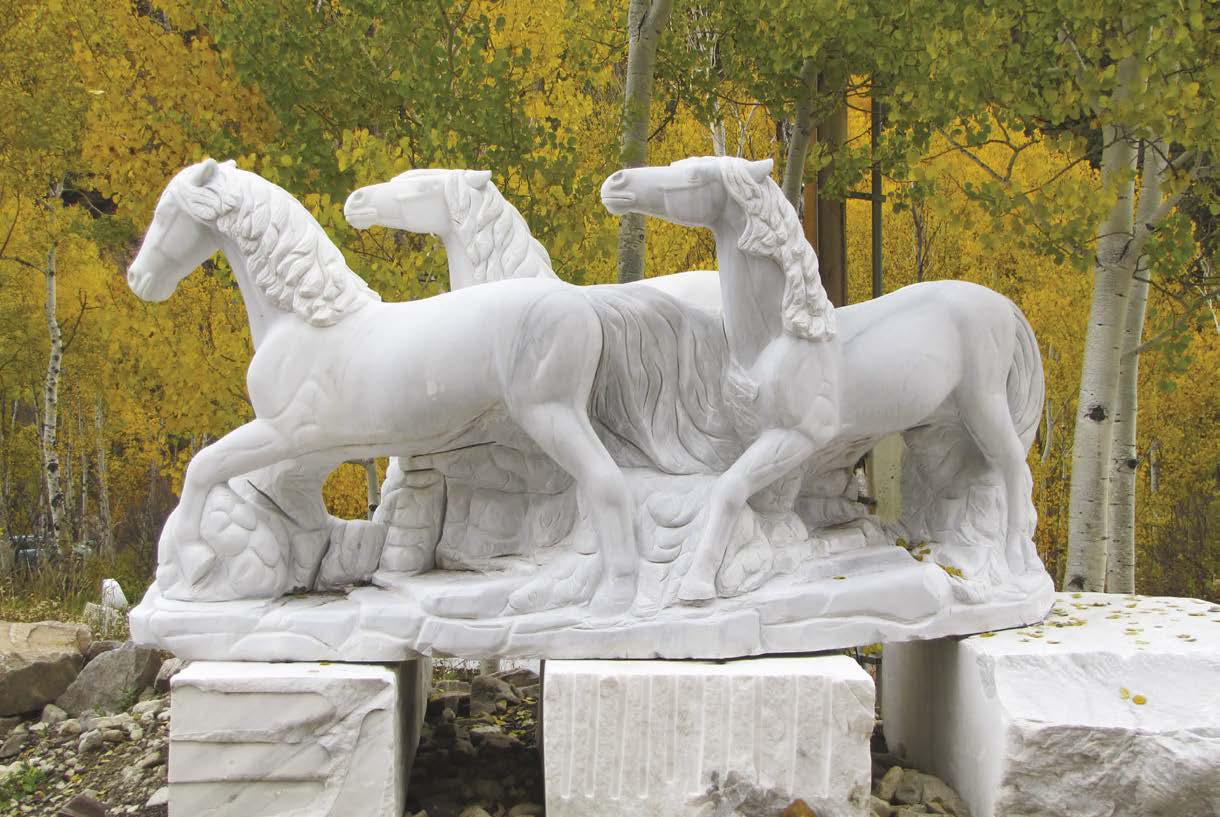Versuchen GOLD - Frei
THE MAGIC OF MARBLE
Rock&Gem Magazine
|December 2022
Sculptors and architects have an abundance of natural stone materials to choose from alabaster, travertine, granite, limestone and soapstone to name a few. But one medium has always stood out - marble. For the last 2,500 years, marble has been chosen for many of the greatest works of sculpture and architecture, from the Parthenon of Classical Greece to Michelangelo's Pietà and Washington D.C.'s Lincoln Memorial.
-

Durable yet soft enough to be workable, marble occurs in both solid and patterned colors from snow-white to a rainbow of soft pastels. With its fine grain, marble takes a gleaming polish and can be worked in great detail.
Because marble occurs in massive formations, it can be quarried as blocks suitable for the largest sculptures and most ambitious architectural applications. To many sculptors, marble's most appealing quality is its slight translucency which imparts a subtle glow to the polished stone.

OUT OF LIMESTONE
For all its beauty, marble originates as drab limestone, a common sedimentary rock that forms through the accumulation of shells, coral and other organic materials. Limestone consists primarily of the calcareous carbonate minerals calcite (calcium carbonate) and/or dolomite (calcium magnesium carbonate).
Most limestone is dark-gray in color; higher grades containing more than 70 percent carbonates have lighter-gray colors. With its dull luster and poor polishing qualities, limestone is not a particularly attractive rock.
But because of its abundance and low cost, it is widely used for exterior building blocks. Its biggest use, however, is as the raw material for manufacturing portland cement.
When subjected to metamorphic heat and pressure, high-grade limestone undergoes a dramatic change. It first takes on a plastic consistency as its fine-grained, crystalline structure is destroyed and many of its impurities driven off. Then, with reduced heat and pressure, this plastic mass recrystallizes as marble with a substantially higher carbonate content and a structure of interlocked grains of translucent calcite and/ or dolomite.
Diese Geschichte stammt aus der December 2022-Ausgabe von Rock&Gem Magazine.
Abonnieren Sie Magzter GOLD, um auf Tausende kuratierter Premium-Geschichten und über 9.000 Zeitschriften und Zeitungen zuzugreifen.
Sie sind bereits Abonnent? Anmelden
WEITERE GESCHICHTEN VON Rock&Gem Magazine

Rock&Gem Magazine
A New Amber Locality Fills a Gap
A sandstone quarry in central Ecuador has yielded the first significant deposit of Mesozoic amber from South America.
1 min
January / February 2026

Rock&Gem Magazine
Did "Left-Handed" Fish Leave Water Earlier than Thought?
Fossil evidence suggests that fish (or \"fishapods\") dragged themselves onto land during the middle Devonian Period.
1 min
January / February 2026

Rock&Gem Magazine
"Lab Quakes” Produce Surprising Results
When faults let loose and earthquakes result, the main effect we mortals experience is the violent shaking.
1 min
January / February 2026

Rock&Gem Magazine
This Egg is No Spring Chicken
How to date a dino egg
1 min
January / February 2026

Rock&Gem Magazine
Have we Already Mined the Critical Minerals We Need
Then why are we throwing them away?!
1 min
January / February 2026

Rock&Gem Magazine
One Toxic Worm
A critter that creates & tolerates orpiment!
1 min
January / February 2026

Rock&Gem Magazine
ROCK & GEM FIELD GUIDE: Silver
Silver (Ag) is a native element and one of Earth's most prized precious metals.
2 mins
January / February 2026

Rock&Gem Magazine
DINOSAURS OF THE HELL CREEK MUSEUM
In the Badlands of South Dakota, just outside the small town of Belle Fourche—pronounced “Bell Foosh”—a new attraction has taken shape that every dinosaur enthusiast should see. The Dinosaurs of the Hell Creek Museum is part hands-on exhibit, part science center and part active research lab.
3 mins
January / February 2026

Rock&Gem Magazine
The Lost Twins of Kongsberg
A Silver Story Resurfaced
3 mins
January / February 2026

Rock&Gem Magazine
Switzerland's ICE PALACE
Walk Inside a Glacier at The Top of Europe
7 mins
January / February 2026
Translate
Change font size
